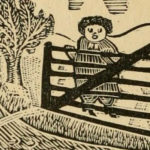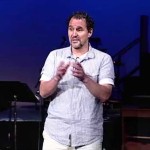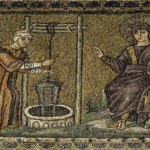We run our website the way we wished the whole internet worked: we provide high quality original content with no ads. We are funded solely by your direct support. Please consider supporting this project.

How the Cross Erases Your Sin
In Colossians 2:14, we read how God canceled the charge of our legal indebtedness which stood against us and condemned us. That word “canceled,” means to wipe out, to erase, or to abolish. By means of the cross, God wiped out our indebtedness to the law that stood over us that Satan used to condemn us. The passage doesn’t just say that he canceled our sin as though he went through a list one by one, wiping out each sin individually. That alone would be beautiful, but he did more than that. Nor does this passage simply say that he canceled our indebtedness as though he paid off the whole account all at once. What God did was even more beautiful than that.
God went to the root of the problem, and he canceled the charge of our indebtedness. This goes beyond wiping away our individual sins or abolishing the debt itself. He canceled the charge itself, which was the power of this indebtedness to hold us in bondage to Satan. He canceled the claim that the indebtedness has any right or power over us to hold us captive.
Think of it this way: suppose you found yourself in great debt. You’ve spent unwisely and then you lost your job. As a result, the bank will soon foreclose on your house and repossess your car. Now suppose I am a very rich person and I have plans to help you out. I could pay off your bills one by one. This would be like God erasing our sin one by one. Or I could contact all of your creditors and pay all of your debts at once. This would be like God erasing our indebtedness.
However if I stop there, the economy will remain in place and money will still have the same power, which means that you could conceivably fall back into debt again. In addition, you have to deal with the poor credit rating and the bad reputation from your economic failure. What God did was more fundamental than either paying off our sins one by one or erasing the debt. He canceled the charge of our indebtedness itself. God blew up the whole economy. He destroyed the very concept of money. In doing so, he destroyed the very claim that money could own you or that banks could own you. He went to the root of the problem by destroying the very concept of indebtedness.
That’s why the Psalmist says, as far as the east is from the west our transgressions have been cast away from us (Ps 103:12). Like the square root of pi, there is no ultimate east and there is no ultimate west. It is a distance that spans an infinity in any direction. If God takes our transgressions and throws them an infinity to the east and an infinity to the west, they are annihilated, obliterated, erased, and canceled.
Under Satan’s rule, where the law has dominion, indebtedness has meaning. While we were created to live in the land of God’s love, because of our rebellion, we were brought into the land of indebtedness to the law. Into this land, God comes and restores the rule of God’s kingdom, where behavior is not motivated by threats and fear through legal means, but by internal transformation by the Spirit. In this new land, the charge of indebtedness has no meaning. The rules have changed.
We could think of this in terms of our citizenship. If you are a citizen of the United States, the laws of another country, like Mozambique or Zimbabwe for instance, are irrelevant. Those laws don’t apply to you. So also, the law of indebtedness don’t apply to us because we’re not citizens in that kingdom anymore. The rules within that kingdom no longer apply. The charge of indebtedness has been canceled.
This is why Paul says: “Therefore there is now no condemnation for those who are in Christ Jesus” (Rom 8:1). Because Jesus canceled the charge of our legal indebtedness that stood against us, we now live in a new land, the land of life “in” Christ Jesus. There, the law of condemnation no longer applies.
—Adapted from 6/3/12 sermon at Woodland Hills Church entitled “I Owe It All To the Devil“
Photo credit: Pierre J. via Visualhunt / CC BY-NC-SA
Category: General
Tags: Jesus, Redemption, Satan, Sin
Related Reading

Part 2: Disarming Flood’s Case Against Biblical Infallibility
Image by humancarbine via Flickr In this second part of my review of Disarming Scripture I will begin to address its strengths and weakness. [Click here for Part 1] There is a great deal in Disarming Scripture that I appreciate. Perhaps the most significant thing is that Flood fully grasps, and effectively communicates, the truth that…

Which Came First: Death or Sin? (podcast)
Greg investigates the laws of nature, the nature of law, the fall of the powers, and the power of the fall in this enlightening episode that evolves right up to the climactic ending. Episode 561 http://traffic.libsyn.com/askgregboyd/Episode_0561.mp3

The Incarnation as an Example of Cross-Cultural Love
Beautiful Faces of Palestine via Compfight Christena Cleveland wrote an excellent piece about the radical cross-cultural nature of the incarnation. I’ve never thought of it quite this way before, but the incarnation is the most profound instance of entering into another culture in a selfless way. Moving outside of our “cultural comfort zone” to more…

Sermon Clip: Love: It’s All About the Cross
In this sermon clip, Greg Boyd talks about how Colossians 3:14 and the definition of love. God designed creation so that we would live in community with God and express God’s love towards each other and creation. However, sin disconnected us from God. In this sermon, Greg shows how we were created in the image…

Jesus and the “Favored Nation”
Nationalism lies at the heart of the Old Testament narrative. This concept is intimately wrapped up with the law-oriented covenant God made with the Israelites at Mount Sinai, for at the heart of this covenant is the promise that obedience would bring national security while disobedience would bring national disaster (Deut. 27-28). What we shall…

Jesus: Our Vision of God
At the beginning of his Gospel John taught that “no one has ever seen God, but the one and only Son, who is himself God and is in closest relationship with the Father, has made him known” (Jn 1:18). He is claiming that, outside of Christ, no one has ever truly known God. In the…
